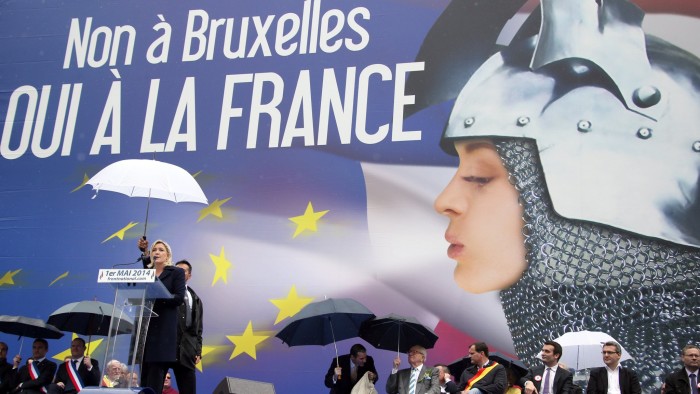Brexit would compound all other European crises

Roula Khalaf, Editor of the FT, selects her favourite stories in this weekly newsletter.
What has happened to you, Europe?” cried Pope Francis, accepting this year’s Charlemagne prize. Here is the question we should all be asking, as a Pew poll finds 61 per cent of the French have an unfavourable view of the EU, more even than in Britain. What has gone wrong? Why is Europe failing and fading?
It is a huge mistake to imagine that a Britain teetering on the brink of Brexit is just an eccentric exception to the continental rule, an expression of insular cussedness by the typically Eurosceptic Brits.
Consider other recent polling data. Across 10 member states, including some of the most pro-European ones, Pew found a median of just 51 per cent taking a favourable view of the union. In the last publicly available Eurobarometer poll of all 28 member states, 43 per cent said things in the EU are going in the wrong direction against just 23 per cent saying they are going right. In other surveys, 48 per cent of Italians declared themselves in favour of leaving the EU, as did 29 per cent of Germans. Need I go on?
In fact, roughly half the people of Britain are broadly pro-European and roughly half of continental Europeans are increasingly “British” in their mistrust of the EU. Yes, there are British peculiarities: the story of the island that became an empire; a nostalgic optimism that ‘we were a great power on our own once, so we can be again’; a different experience of war and almost no direct experience on British soil of defeat and occupation, let alone dictatorship; and the legacy of Margaret Thatcher, which has shaped two generations of conservative politicians and journalists.
More important are the common threads in our fading European tapestry. On the continent, as in Britain, there is a widespread view that Europe is failing to deliver economically. In the Pew poll, only two of the 10 countries surveyed — Germany and Poland — showed more people approving than disapproving of the way the EU is dealing with economic challenges. In Greece, the disapproval rate is 92 per cent; in Italy, France and Spain, more than 60 per cent.
This confirms, in my view, that rushing into a deeply flawed monetary union — bad design, too large and diverse membership — was the biggest single mistake in the history of European integration.
Also common to Britain and the continent is a populist rhetoric denouncing remote, self-serving, cosmopolitan elites. No matter that the populist attackers are almost all themselves drawn from the elites, including such horny-handed sons of toil as Nigel Farage (privately educated, former City trader) and Boris Johnson (Eton and Oxford), not to mention the Herr-Professor-Doktors of Alternative for Germany and Marine Le Pen (two degrees in law). Populist elites blaming it on “the elites” has real popular traction.
Then there is migration. Overwhelming majorities are unhappy with the way the EU is handling the refugee crisis. Mr Farage’s UK Independence party pioneered the negative linkage of resentment of immigrants and hostility to the EU — the Brexiters’ strongest weapon — and that linkage has now been taken up by parties in Austria, Germany, France and the Netherlands, among others. Yet asked in regular Eurobarometer polls, “What does the EU mean to you personally?” nearly half say, “freedom to travel, study and work anywhere in the EU”. So what one half of Europe’s people hates is precisely what the other half loves.
This illustrates a broader point: the European project is a victim at once of its failures and of its successes. The euro mess, unemployment, the absence of any effective European policy in the Middle East that might address the causes of the refugee crisis, the failure to secure the external borders of the Schengen area, the way all national politicians blame “Brussels” for everything bad and credit themselves for everything good — all these failings obviously contribute to the crisis of confidence.
At the same time, because of the extraordinary success of the EU over the last quarter century in creating an unprecedented area of freedom of movement, peace (except at the edges) and relatively open societies, a whole younger generation has grown up taking this for granted. Even if they understand the argument intellectually, few feel in their bones that this could all be undone and Europe nosedive back to its bad old ways. In his Charlemagne prize speech, the Pope, whose 15th-century predecessor Pius II more or less invented the early modern idea of Europe , quotes the author Elie Wiesel to the effect that Europeans need a “memory transfusion”. Somehow we have to instil an urgent consciousness of the ever-present possibility of relapsing into European barbarism, without having to go through it all again ourselves.
Brexit would be a disaster for Europe. It would compound all its other crises and blow wind into the sails of those numerous continental Europeans with ‘British’ views of the EU. Almost as bad would be to greet a British vote to Remain with a sigh of relief and return to business as usual. Do not let the British referendum be yet another wake-up call at which Europe fails to awake.
The writer is professor of European Studies at Oxford and the author of Free Speech
Letter in response to this report
The single currency has achieved one of its goals / From Charlie Robertson
Comments